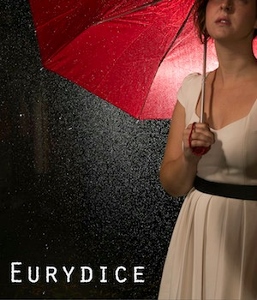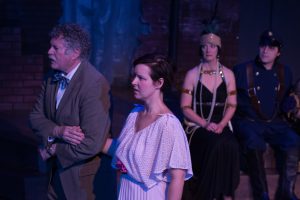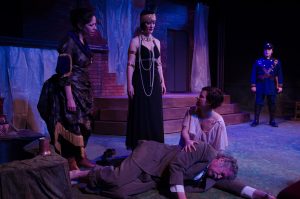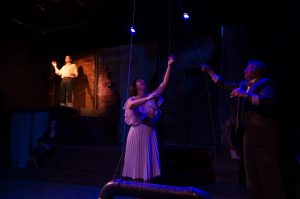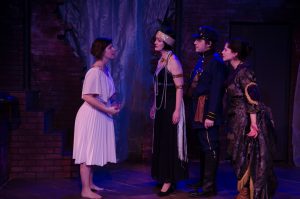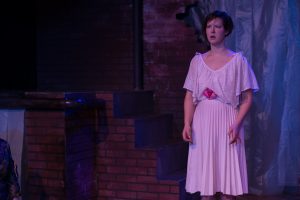LEARNING TO BE DEAD
Orpheus usually gets top billing in the classical Greek legend. He is of course the master of music who literally goes to Hell to retrieve his beloved Eurydice, abducted by Hades, king of the underworld. In Sarah Ruhl’s deeply personal 90-minute one-act the emphasis is on the kidnap victim, not the artist who fails to save his new bride from her own craving for reassurance or his infernal rival. (Told not to look back as he leads Eurydice from the land of the dead, Orpheus imprudently and disastrously complies with her desire for attention—in one last look).
In Promethean Theatre Ensemble’s staging of Ruhl’s 2007 Eurydice, the dramatic payoff for director Nicole Hand is Eurydice’s reunion with her dead father. Much like the last act of Our Town, where Emily and the other dead residents of the local cemetery must learn to let go of life and distance themselves from loved ones who will soon enough forget them too, Janeane Bowlware’s Eurydice is more interested in sharing memories with the father who slowly recognizes her than to return to her letter-writing lover among the living. Polonius-like, dad (Sandy Elias) offers sententious advice and some seminal recollections. But he didn’t just cross the River Styx; he will drink from the River Lethe and forget what it was like to love and live.
So, Ruhl implies, must Eurydice, voluntarily or not, if she’s to handle being dead. If she erects strings in a forbidden room, they must be taken down to signal her utter disconnect. She must finally learn the language of Stones, the custodial Chorus (Susie Griffith, Meghann Tabor and Brendan Hutt) who sternly teaches her the rules of the dark realm. Jordan Golding’s dour Orpheus may send Shakespeare’s plays to Eurydice (where she becomes Cordelia to her father’s Lear), but Eurydice’s new master is Hades himself (Jared Dennis), here a petulant boy who suddenly grows into the man who seduced her into the afterlife.
Hand’s inclusion of popular songs like the lovers’ rendition of “Don’t Sit Under the Apple Tree” adds nothing but irritating anachronisms unable to convey Ruhl’s much more site-specific nostalgia. But then Ruhl’s interest in retelling the saga—to “have a few more conversations” with her father who had died of cancer ten years before—makes this version less universal than Gluck’s great opera Orphée & Eurydice or even Offenbach’s satirical Orphée aux Enfers. Still the grieving process is never over, the lie of “closure” notwithstanding. Orpheus too must finally make an accommodation with oblivion, admitting the transience of even his supposedly deathless songs.
Unfortunately, Ruhl’s very circumscribed memory-making motivation never quite achieves a wider reach in this purposeful but never compelling production. Boulware’s chirpy and bubbling Eurydice lacks gravitas. As her increasingly departed dad, Elias is more avuncular than paternal and Golding’s impassive Orpheus seems more pedestrian than driven. The heartbreak here (“Dip yourself in the river”) is too cerebral. But it’s palpable enough for those who need it.
 photos by Tom McGrath, TCMcG Photography
photos by Tom McGrath, TCMcG Photography
Eurydice
Promethean Theatre Ensemble
Athenaeum Theatre Studio One
2936 N. Southport Ave.
Thurs-Sat at 7:30; Sun at 2
(Industry Night Jan. 16 at 7)
ends on February 11, 2017
for tickets, call 773.935.6875
or visit Promethean Theatre
for more shows, visit Theatre in Chicago
